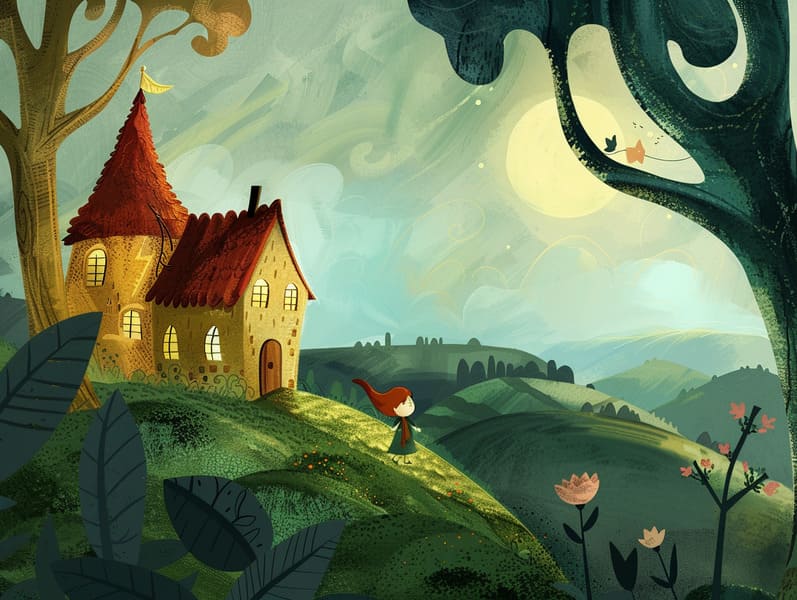Discovering the Wonder of Nighttime Adventures: Building Valued Memories with Your Loved Ones
Discovering the Wonder of Nighttime Adventures: Building Valued Memories with Your Loved Ones
Blog Article

The end of the day is a precious time for adults and their kids. It’s a time to ease into rest, cuddle up, and share the joy of sleepy-time tales.
For ages, nightly tales for children have been a beloved practice, offering more than just a way to rest. They provide an chance for relationship building, knowledge acquisition, and encouraging imagination.
The Value of Bedtime Stories
Children's bedtime stories are not just a way to close the day. They play a crucial role in a child’s maturation and in building the guardian-child link. Here’s why they matter:
1. Connection Time: Nightly storytelling builds a special loving connection between families. It’s a moment of closeness that helps children feel appreciated and secure.
2. Vocabulary Building: Being read to helps children develop their linguistic abilities. They acquire new terms, understand form, and develop their attention and analytical skills abilities.
3. Creative Development: Stories for kids usher them to imaginary worlds, promoting vision. They see characters, settings, and adventures, which fuels their creativity.
4. Emotional Growth: Stories for children often present characters facing trials and states. These tales help kids grasp and address their own moods, developing emotional maturity.
5. Cognitive Skills: Paying attention to a narrative helps children develop focus, remembering, and thought processes. They gain to follow lines of thought, remember details, and deduce results.
Making Stories a Bedtime Habit
Developing a night-time practice that has reading narratives is effortless and beneficial. Here’s how to establish a valued part of your end-of-day routine:
1. Find a Cozy Place: Pick a peaceful place where you and your child can snuggle up without disturbances. A snug bed or a quiet reading nook works great.
2. Establish a Routine Time: Choose a routine time each night for narratives. Predictability helps children be accustomed and makes the practice easier to follow.
3. Select Stories by Age: Choose tales that match your child’s understanding. Young kids might like picture books with basic stories, while grown children may be drawn to novels with more engaging plots.
4. Interact with the Story: Turn the tale feel vivid by incorporating different voices for characters, adding effect sounds, and having your child to take part. Ask queries about the story to involve them.
5. Set a Relaxing Mood: Softly light the lights, use whispers, and create a relaxing environment to help your child get ready for sleep.
Finding the Best Bedtime Stories
There are abundant sources where you can find fantastic bedtime stories for children. Here are some options to try:
1. Children’s Books: Go to your local library or bookstore to find a great selection of bedtime stories for kids. Checking out the selections together can be a fun activity that also lets children to decide on stories that they like.
2. Web Sources: There are many sites that offer free bedtime stories. Sites like kids' story platforms provide a variety of short stories for kids that you can print out. These sites are great for finding new and different stories without expense.
3. Apps for Storytelling: For nights when you’re too weary to read, explore audiobooks or storytelling apps. These can provide a calm narration to read your child a story, ensuring they still get their bedtime story fix. Apps often offer fun elements that can keep them engaged further.
4. Individualized Stories: Write your own stories tailored to your child’s experiences. Personalized stories can be extremely engaging and meaningful. You can incorporate your child in the storytelling process, making them a part of the adventure.
Positive Sides of Short Stories
Compact tales for little ones are highly effective for bedtime. They provide all the positives of longer stories but are more short, making them perfect for winding down before sleep. Here’s why short stories are a great choice:
1. Clear and Simple: To-the-point tales are direct and easy for kids to get, even after a long day. They can speedily grasp the narrative and enjoy the story without getting lost.
2. Rapid Interest: Concise stories swiftly engage children, catching their focus and interest. This makes them great for keeping bedtime traditions efficient yet enjoyable.
3. Many Choices: Concise narratives make possible for variety in your bedtime books. You can find a different story each night, keeping the routine fresh and exciting for your child.
4. Time-Saving: For busy parents, brief tales are a time-saving way to verify children still kids stories get their nightly dose of storytelling. They fit well into a busy schedule while still offering the full benefits of a bedtime story.
The Joy of "Read Me a Story"
The simple phrase, “Will you read me a story?” can unlock a world of magic for children. Agreeing to this request not only caters to a child’s want for attention and engagement but also fosters lasting memories. Here’s why it’s wonderful:
1. Bond: Sharing stories to your child creates a deep emotional relationship. It’s a time for affection, sharing, and bonding.
2. Custom: Creating a bedtime story routine creates a prized tradition that children are excited for every night. It’s a tradition that can be passed down through generations.
3. Mutual Learning: As you read aloud, you’ll observe your child’s advancement and advancement. Their questions, reactions, and understanding of the stories progress, offering insights into their developing minds.
4. A Safe Haven: Bedtime stories provide a safe space for children to explore emotions, face fears, and find comfort in the reliable presence of a parent.
Summing Up
Children’s bedtime stories are a vital tool for nurturing a child’s growth and creating unforgettable times of bonding.